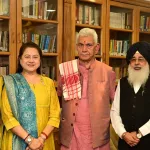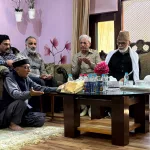FOOD SAFETY
In what amounts to a grave violation of public trust, disturbing reports have emerged from the Kashmir Valley about rotten, unidentified, and potentially non-halal meat being sold in local markets and consumed by unsuspecting citizens. In a region where halal practices are a religious necessity—not merely a cultural norm—this is not just a scandal. It is an outrage. It is a betrayal. And above all, it is unacceptable.This isn’t just a failure of market oversight—it represents a complete collapse of governance, religious ethics, civic responsibility, and community conscience.
Public health jeopardized
Ensuring food safety is among the most basic responsibilities of any administration. Citizens purchasing meat from markets do so with a reasonable expectation that the products are safe, hygienic, and inspected. In Kashmir, that expectation has disintegrated.
Rotten meat is not just unpalatable—it is dangerous. It poses serious health risks, including food poisoning, bacterial infections, and potentially fatal illnesses such as salmonella and botulism. For low-income families, without access to proper healthcare, the consequences can be devastating.
The continued sale of such meat, without oversight or accountability, reflects a shocking breakdown in food regulatory mechanisms.
A Spiritual betrayal
In a Muslim-majority region like Kashmir, halal compliance is a religious obligation. Halal laws are rooted in Islamic teachings of hygiene, humane slaughter, and lawful consumption. Selling meat of dubious or unlawful origin is not merely a regulatory lapse—it is a betrayal of faith.That some of this meat is reportedly being sold by Muslim traders deepens the distress. It raises urgent, uncomfortable questions:
- How can a Muslim knowingly sell meat of questionable or haram origin to fellow Muslims?
- Has profit become more sacred than piety, ethics, and community trust?
Unknowingly consuming haram meat forces believers to transgress their own faith. The psychological and spiritual anguish caused by such betrayal cannot be overstated.
Administrative Silence
Administrative institutions are responsible for safeguarding public health and religious sensitivities. Yet they have failed—utterly and unmistakably.
In a time when hopes were pinned on improved governance under the newly elected administration in Jammu and Kashmir, this regulatory collapse is not just disappointing—it is alarming. If the government cannot guarantee the safety of food on our plates, how can it be trusted with more complex governance?
This is not just bureaucratic failure—it is a collapse of moral duty.
“Assi Kam Gunah Che Karamit?” (“What sins have we committed to deserve this?”) is no longer just a lament—it is a question of systemic betrayal.
Why was working system dismantled?
Until recently, Srinagar Municipal Corporation (SMC) operated a credible slaughterhouse system. Animals were slaughtered under veterinary supervision, inspected, and only then allowed into the market. Carcasses were stamped to certify their health and halal status.
This system protected public health, ensured religious compliance, and built public confidence.Then, without public consultation or explanation, this entire system was scrapped. Now, anyone can bring meat from anywhere—including outside Jammu & Kashmir—and sell it freely. There are no checks, no traceability, no safeguards.
This raises pressing questions:
- Who authorized the dismantling of this system?
- Why was it removed without a modern or digital alternative?
- Where are the veterinary officers and food safety inspectors?
These are not rhetorical questions. They demand immediate, transparent answers.
Moral Rot: Complicity from within
While state failure is central, we must also confront a painful truth—some within our own community are complicit.
Reports suggest that certain butchers and sellers knowingly distribute rotten or suspect meat. This is not just illegal—it is immoral. It reflects a disturbing erosion of conscience, where profit outweighs both ethics and faith.
Even more disturbing is the silence from religious leaders, trade bodies, and community elders. Their inaction makes them silent partners in this ongoing betrayal.
The Lakhanpur Loophole
Much of the suspect meat reportedly originates from outside Jammu & Kashmir, entering through the Lakhanpur checkpoint. In the absence of veterinary inspections, cold-chain systems, or documentation, meat of dubious origin—including possibly dead or non-halal animals—can enter Kashmir’s markets unchecked.This is a catastrophic regulatory failure.
- Why is there no mandatory inspection at entry points?
- Why are cold-chain protocols not enforced?
- Where are the food safety and veterinary teams along transit routes?
Besides risking public health, this situation undermines local livestock producers, exposing them to unfair and unsafe competition.
The way forward
This cannot be another forgotten scandal. Immediate steps are essential:
- Independent Investigation: A time-bound, transparent probe must trace the entire meat supply chain—from origin to market—and identify both private and official culprits.
- Reinstate the Supervised Slaughterhouse System: Revive and modernize the centralized slaughter system under SMC supervision, including digital stamping, camera monitoring, and real-time traceability.
- Tighten Entry Point Inspections: Install robust veterinary and food safety checks at Lakhanpur and other critical entry routes. No meat should enter without certified clearance.
- Strict Punishment for Offenders: Those selling rotten, dead, or non-halal meat must face strict penalties, including imprisonment, heavy fines, and permanent license cancellation.
- Fix Administrative Accountability: Suspend or prosecute officials found negligent or complicit—especially food safety officers and veterinary inspectors.
- Empower Citizens: Launch a public helpline and app to report illegal or unhygienic meat sales. Reward whistleblowers. Foster community-led vigilance and inspections.
This is more than a food safety crisis—it’s a mirror reflecting deeper societal rot. If we cannot ensure the purity of what we eat, what else have we allowed to decay—our systems, our values, our collective conscience?This must be a turning point—not just for food regulation, but for ethical governance and community responsibility.
Let this not be just another news cycle. Let it mark a course correction in how we govern, how we do business, and how we live in society.The meat on our plate must never again be a symbol of decay—of our food systems, our faith, or our moral compass.
(The authoris a Kashmir-based commentator on civic affairs and governance. He is a freelancer, columnist, and national TV debater. He can be reached at: [email protected])







